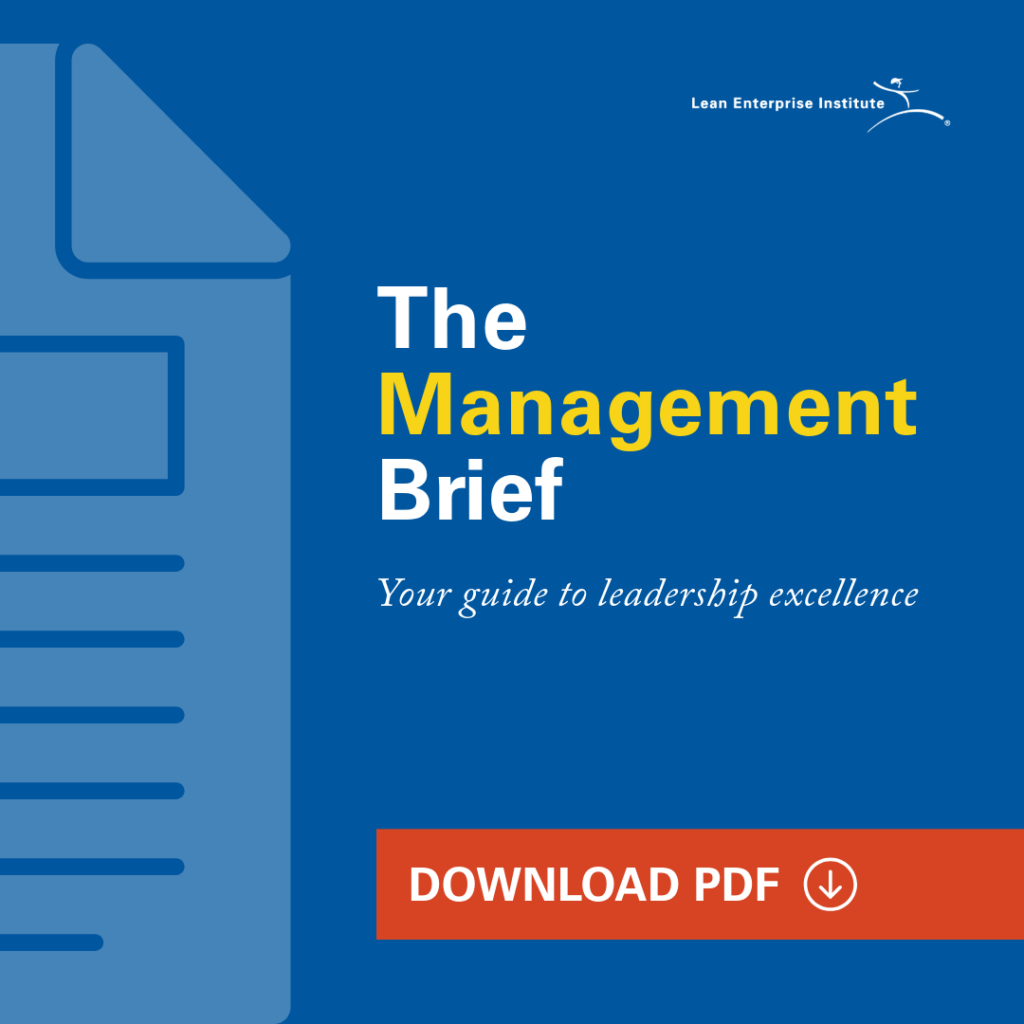The Management Brief is a weekly newsletter from the Lean Enterprise Institute that bridges the gap between theory and practice in lean management. Designed for leaders focused on long-term success, it delivers actionable insights, expert perspectives, and stories from real-world practitioners. Each edition explores the principles of lean management—strategy deployment (hoshin kanri), operational stability and continuous improvement (daily management), and problem-solving (A3)—while highlighting the critical role of leadership. Subscribe to join a growing community of leaders dedicated to creating organizations built for sustained excellence.
In the initial postings of The Management Brief, we’ve read and heard about the importance of lean management and the development and execution of a management system. Our recent Current State of Management Survey finds that two-thirds of LEI community members have a management system in place, but one-third are without one or unsure if their organizations have a management system.
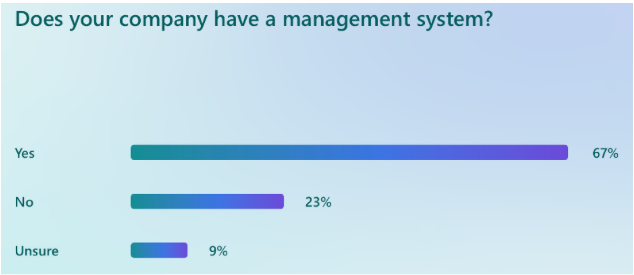
LEI President Josh Howell described in the initial The Management Brief the “three vital processes” that make for lean management. The vast majority of survey respondents are familiar with these processes:
- Hoshin kanri: 40% very familiar and 38% somewhat familiar
- Daily management: 70% very familiar and 21% somewhat familiar
- A3 problem-solving: 69% very familiar and 23% somewhat familiar
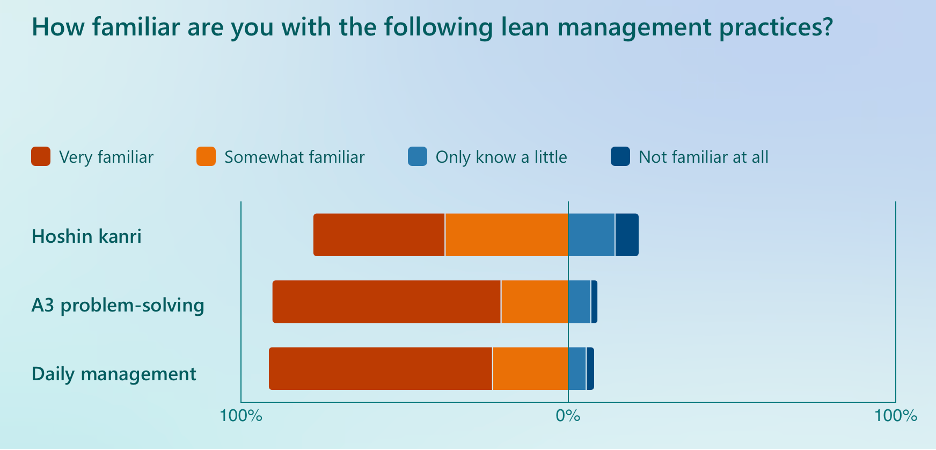
But many LEI community members have not necessarily taken that familiarity and used it to apply working processes within their organizations: 63% and 57% employ a daily management system and A3 problem-solving, respectively, but just 28% have hoshin kanri in place and 21% have none of the lean management processes in place. Only 19% of survey respondents report having all three processes in place.
LEI community members with a management system in place are significantly more likely to have the three processes in place:
- Hoshin kanri: 37% vs. 10% without a management system or unsure
- Daily management: 76% vs. 36% without a management system or unsure
- A3 problem-solving: 67% vs. 35% without a management system or unsure
- All three processes in place: 26% vs. 4% without a management system or unsure
A management system supported by the three processes helps organizations develop, disseminate, and act/adjust on their corporate strategies. Yet less than half of respondents indicate that their organizations exhibit desired strategic-centric behaviors, and up to one-third clearly do not.
Strategic Behaviors
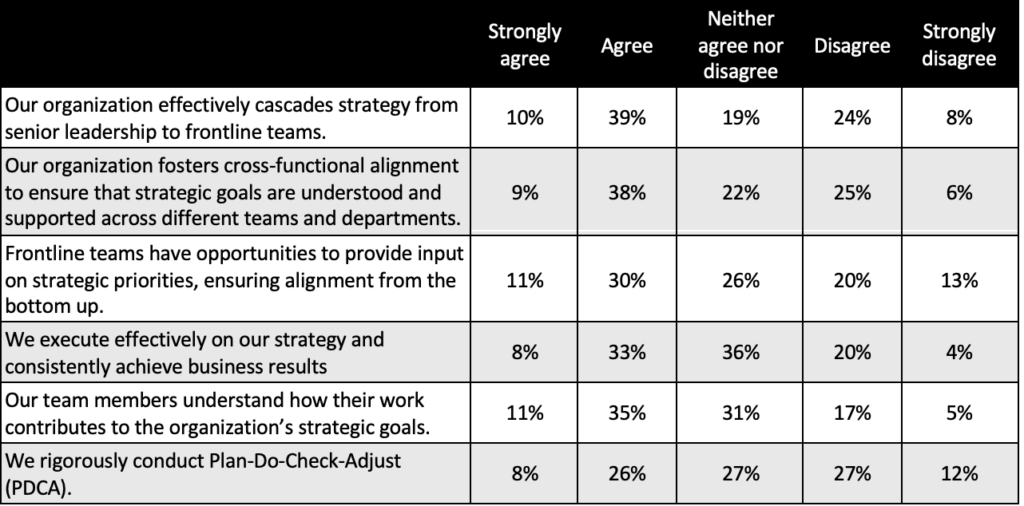
LEI community members are a bit better at achieving desired behaviors related to operations, A3 problem-solving and continuous improvement, and leadership development and team empowerment. But, here too, there is a disparity between those with lean capabilities and those without:
Operations
- Our organization has reliable systems to maintain stable daily operations: 63% somewhat agree or strongly agree vs. 21% somewhat disagree or strongly disagree
- We have processes in place to identify and address operational issues quickly: 53% vs. 23%
- We consistently meet performance targets and deadlines: 51% vs. 22%

Problem-Solving and Continuous Improvement
- Our organization encourages proactive problem-solving across all levels: 66% somewhat agree or strongly agree vs. 20% somewhat disagree or strongly disagree
- We regularly analyze the root causes of issues rather than just treating symptoms: 54% vs. 27%
- There is a strong culture of continuous improvement in our organization: 51% vs. 27%

Leadership Development and Team Empowerment
- Our organization invests in leadership development and growth opportunities: 65% somewhat agree or strongly agree vs. 19% somewhat disagree or strongly disagree
- Team members are enabled to make decisions within their areas of responsibility: 69% vs. 14%

Approximately one-quarter to one-third of LEI community members are also challenged to develop problem-solving capabilities within their organizations as well as establish a strategic planning approach and practices that can lead to long-term success. The findings for leaders’ ability to coach and mentor team members is especially surprising:
Problem-Solving Capability
- We have a clear, structured approach to developing problem-solving skills across the organization: 46% somewhat agree or strongly agree vs. 30% somewhat disagree or strongly disagree
- Leaders actively coach and mentor team members to strengthen their problem-solving skills: 36% vs. 37%
- Our organization provides training and tools (e.g., root cause analysis, A3 problem-solving) to enhance problem-solving capabilities: 57% vs. 27%

Strategic Planning
- We have a clear, structured approach to strategic planning (e.g., annual or quarterly sessions): 57% somewhat agree or strongly agree vs. 24% somewhat disagree or strongly disagree
- Our organization uses specific tools or frameworks (e.g., OKRs, balanced scorecard, hoshin kanri) to guide long-term strategy: 46% vs. 32%
- Our leadership team regularly revisits long-term goals and adapts them based on internal and external changes: 53% vs. 25%

There were 270 LEI community members that responded to the survey, which we further identified by role in their organization and by the industries in which their companies operate.
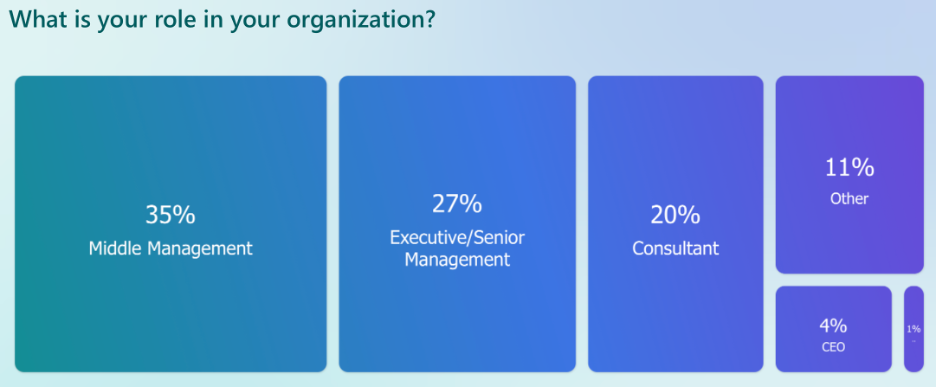
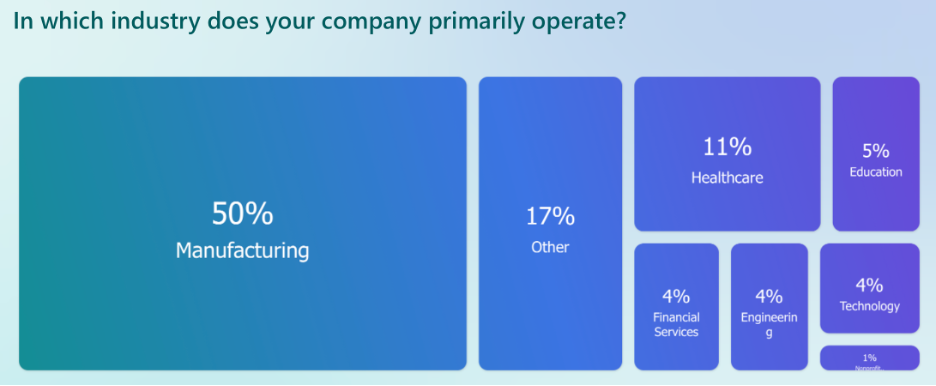
Thank you to everyone who participated in the survey! You can see the complete results here. Your feedback will guide us in tailoring The Management Brief to better address the challenges and priorities you’ve shared, reinforcing its purpose as a resource for actionable leadership insights.

